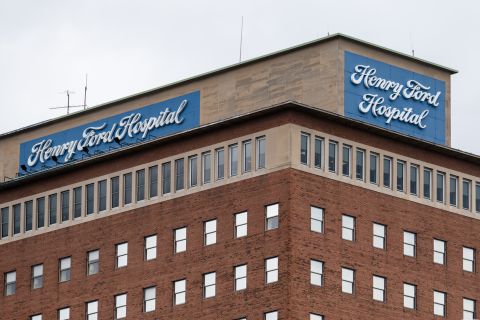
A governing board will include representatives from both systems, the announcement said.
Also unclear is how Henry Ford will accommodate the Catholic mission of Ascension — a crucial consideration in issues such as abortion, birth control and care for patients in the LGBTQ community.
“Both organizations are committed to working to maintain the Catholic identity of the Ascension Michigan facilities included in the partnership,” according to the joint announcement.
“Conversations on the future state of the Catholic identity of these facilities are ongoing,” it read.
The new “integrated healthcare delivery network” will create an expanded system with about $10.5 billion in operating revenue, and include about 50,000 staff at more than 550 sites.
The announcement boasted that the venture will “dramatically expand and enhance integrated” care across southeast and mid-Michigan but both systems declined to answer additional questions.
Henry Ford spokesperson Dana Jay wouldn’t say why the system wouldn’t provide leaders to interview. Ascension spokesperson Chris Gleason said no one was available at Ascension to answer reporters’ questions.
In general, the agreement will allow the hospitals to better coordinate care, cut costs, educate future providers, and attract “top talent,” according to the press statement.
While the announcement seemed to frame an equal partnership, the latest financial statements suggest that Ascension is struggling financially.
As one of the nation’s largest health systems, Ascension showed a single year net loss of $2.66 billion for the fiscal year that ended in June. Henry Ford Health finished 2022 with $138,000 in operating margin — a $168 million improvement compared to 2021, according to separate statements issued earlier this year by the systems.
The announcement follows several other tectonic shifts in health care in recent years as providers say they are facing double pressures of crippling staff shortages and increasing costs of supplies and equipment — demands that have forced them to take beds offline across the state.
Leaders have also said they’re making changes to meet consumer demand for more primary care as well as cutting-edge acute care facilities.
In northern Michigan last month, Munson Healthcare announced a consolidation plan that shifts acute care away from its smaller hospitals, while bolstering primary care. Earlier this year, Sparrow Hospital, the teaching site for Michigan State University doctors and nurses, was absorbed into University of Michigan’s Michigan Medicine. And in 2021, behemoths Spectrum and Beaumont sent shock waves through the state’s health care industry when they merged to become Corewell, the state’s largest system.
At the same time, the squeeze is tightening around smaller, more rural facilities, such as Kelsey Hospital in northern Michigan, which Corewell closed earlier this month.
The Henry Ford-Ascension agreement still must be approved by state and federal regulatory agencies, but leaders hope to have it finalized by next summer.
And as with other recent mergers and changes, the announcement came with the promise to “advance the health … and improve outcomes, access and equity” for the vulnerable.
